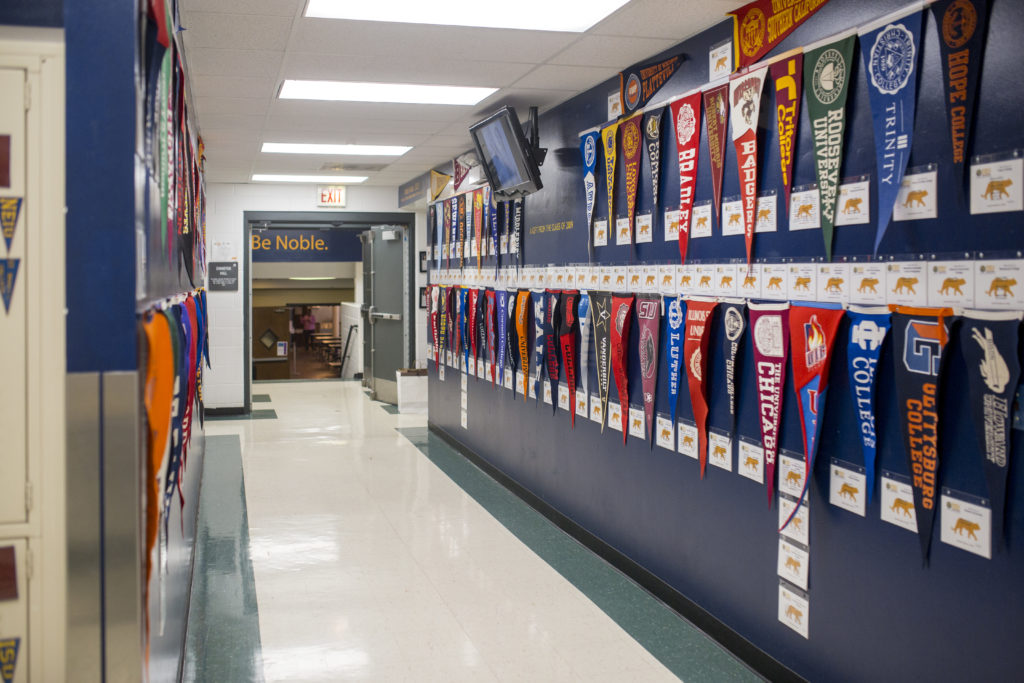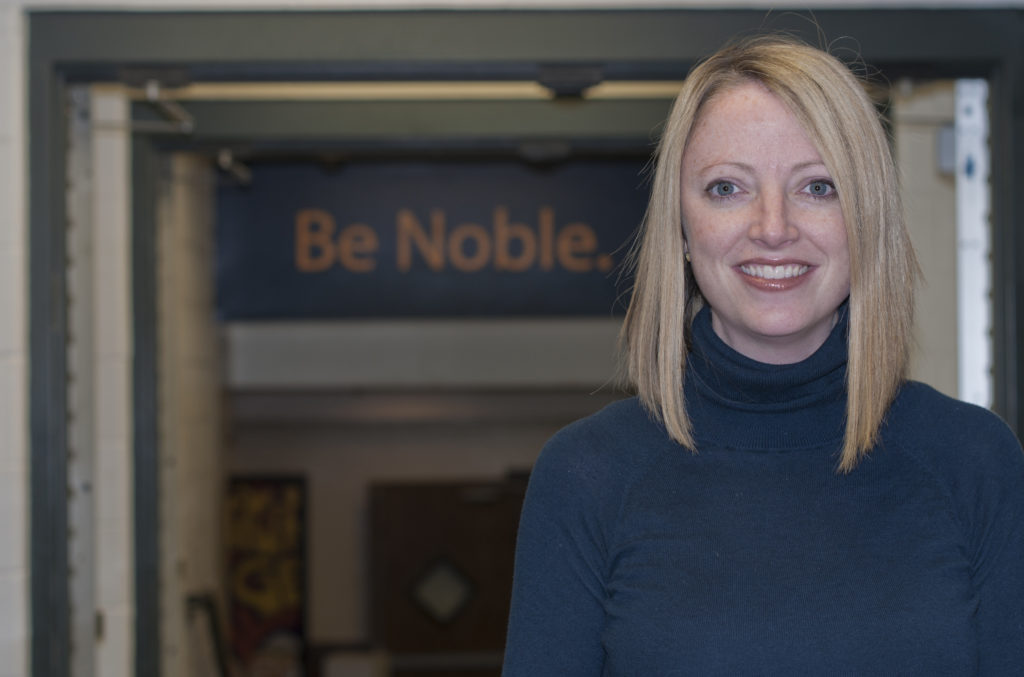Chicago Unheard recently spoke with Ellen Metz, Head of Schools for the Noble Network of Charter Schools. Metz began her teaching career at Farragut Career Academy in Little Village. After four years at Farragut, she headed to Noble Street College Prep to teach because she was enthralled with Noble’s mission and commitment to results. Metz taught, served as an assistant principal and later became principal of the Noble Street campus. Now, as Head of Schools for the entire network, Metz ensures the Noble Network’s 18 campuses are serving students with excellent experiences that help them reach their academic and personal goals.
Tell us about Noble’s approach to distance learning. What has worked well so far?
At Noble, we’re always striving towards the right balance of autonomy and support for our schools. Autonomy is important to us because we know that each of our schools has a unique context, community, and identity. We believe that decisions that pertain to student experience are best made at the school level, taking into consideration each schools’ community, surroundings, and needs. The role of Noble’s Support Team, the team that I’m on, is to support our campuses to achieve their goals while maintaining and acknowledging the uniqueness that makes each campus so special.
At this moment, first and foremost, we want to make sure that our students and staff are safe. Our principals are making sure that we are in touch with each of our students. We’re also making sure that our students’ basic needs are met. Do they have food? Do they have access to the internet? Do we know how they are doing and feeling? We’re asking ourselves similar questions about each of our staff members. Asking ourselves these questions daily and weekly is keeping us focused on the humanity of this situation. Layered on top of that top priority of safety, we’re focused on engagement.
As a network of schools, we made commitments that are guiding us through this time. They are grounded in the high expectations we’ve always had, for ourselves and our students. They are also guided by principles of equity and the compassion that we think this moment requires.
Our six Remote Learning Commitments are:
- Ensure that remote learning materials are available to students/families that reinforce critical grade-level standards and prioritize social and emotional needs.
- Monitor and track student engagement on a weekly basis.
- Ensure educators are virtually available and engaged with their students every school day.
- Maintain established structures to facilitate staff collaboration, planning, and development regarding the implementation of remote learning plans and to support long-term planning.
- Ensure the school community is virtually available to students and families during regular school day hours.
- Support the continued development of all educators to meet the demands of remote learning.
2. Tell us about some of the unique challenges you’ve faced in rolling out a remote learning program to Noble students. How have you overcome them?
The scale of this pandemic is massive, and its implications are far-reaching. But we’ve tried to approach this challenge as a learning opportunity, an opportunity to grow and reimagine schooling.
One of the biggest barriers we faced was making sure that we met our first commitment to ensuring that each of our students had access to remote learning materials. We expected to see this virus disproportionately impact communities of color in Chicago, so we proceeded with an abundance of caution in upholding Illinois’ stay-at-home order. Rather than asking families to pick up devices (which would put them, food service workers and building engineers at greater risk) we have directly shipped over 6,300 Chromebooks and 1,300 WiFi hotspots to students in need.
Another challenge we’ve faced is that we’ve had to get our teachers up to speed on various new technology platforms. As a former teacher and principal, I can tell you that this has been a daunting task. Some of these platforms are very intimidating. But we’re working at it, not giving up, and making sure that those teachers who are stronger at using technology are supporting others around them.
Finally, because one of our commitments centers around engagement, we measure student engagement through Google classroom and the engagement of our staff through short pulse surveys. Data has always been central to Noble’s approach, and we’ve established new practices to ensure we’re gathering data to help us make decisions for this moment.
I can tell you that our experience over the last few weeks confirms what we have always believed: the schoolhouse matters mightly, and being in-person matters. As we look ahead to the next school year, we know our students need in-person opportunities to learn, grow, and build vital relationships.
You’re the Head of Schools for a network of 12,000 students, but you’re also a mom. How do you balance the needs of your Noble family with the needs of the Metz family?
Like so many other working parents, I’ve struggled to work full time while homeschooling my two daughters, who are 10 and 6 years old. However, I know how fortunate I am. I’m fortunate that I have a job that I can do, at least in part, from home. On my best days, I’m able to block an hour each day to homeschool my daughters. On other days, that’s not happening at all. We’re doing the best we can.
The challenges I’m facing at home inform my leadership, leadership philosophy, and decisions. What I know to be true is there are good days and bad days, so flexibility on when work is due is key. Though homeschooling is challenging with school-aged children, parents of infants and toddlers aren’t able to leave their children unattended, which presents a new set of obstacles. All parents want their children to thrive emotionally and to not lose learning ground during this unsettling time. If that’s not happening on a given day, a feeling of failure can set in. I draw on my experiences as a mother to deeply inform my leadership and decisions which feels more important than ever now.

Noble prides itself on sending 98% of students to college. What has this disruption meant for the college application process? How has Noble adapted?
We’re devastated to think of the far-reaching impact this pandemic has had on the college application and enrollment process. However, this pandemic doesn’t change our vision and mission. We still believe that every one of our students deserves access to a 4-year college degree.
I will say that there are a few things at Noble that allow us to be incredibly nimble and supportive of our students in this area. Two systems, in particular, come to mind.
First, we have dedicated campus college teams that are nationally recognized for their work in getting students to and through college. These teams are hustling right now to stay in close contact with seniors and colleges and universities around the country, making sure we are aware of any programmatic shifts or changes in timelines or application processes for enrollment, scholarships, or financial aid. We still hold our college goals dear and commit to relentlessly supporting students in the Class of 2020 now and for years to come.
The second system is our advisory system, which is another sacred aspect of a Noble education. Each Noble student is part of an advisory with students in the same graduating class and a staff member, who becomes their “advisor.” Students keep the same advisory group for all four years of high school, and many aspects of this program are geared toward college readiness. Our advisory system allows students to develop close relationships and bonds, and we’ve seen our advisory groups become like extended families. Advisory groups have continued to meet virtually over the last few weeks, and that’s been such a gift. Now more than ever, our advisory groups are allowing students to stay connected to each other and with another adult, who is not necessarily one of their current teachers, and helping us maintain our unwavering focus on college.
If you had 10 minutes with city, state, or federal leaders, what are a few things you would tell them about what Noble/Chicago’s students need?
First and foremost, I would ask our city, state, and federal leaders to connect with families and students directly and ask them what they need right now. We’ve been doing that on a number of topics, from how we can help meet students and families basic needs to how families and students want to celebrate prom and mark their high school graduation.
Though inequities existed prior to the pandemic, they are being even more illuminated now, and I would encourage our elected and other leaders to use this as an opportunity to think “outside of the box” about school facilities. As other industries permanently shift to remote routines and vacate buildings, the city should prioritize subsidizing rents so schools can access them.
As is the case for many public schools in Chicago, many of the facilities that house Noble schools are grossly inadequate–they were before the pandemic and are even more so now. It would be amazing for Chicago students to have access to any unused space that would allow us to reimagine the school day and schooling in general.
Another inequity that has been laid to bare in this time and that I would urge our leaders to address is the digital divide. It’s clear that some amount of schooling will need to continue virtually and the Internet should be a public utility.
Every public school student in Chicago should be supplied with a laptop that has a camera, a headset with a microphone, and a keyboard so remote learning can be as successful as possible.
And, finally, I strongly believe public transportation should be free for public school students, and certainly if we want them to access schooling in other buildings or non-traditional spaces.
Maureen Kelleher
Latest posts by Maureen Kelleher (see all)
- CPS Parents Wanted for Research Study - March 27, 2023
- Tomorrow: Cure Violence with #Belonging - August 17, 2022
- Still Looking for Summer Camp? - June 13, 2022

2 comments for “Wondering How Noble Schools Are Handling Pandemic Learning? Head of School Ellen Metz Tells All”